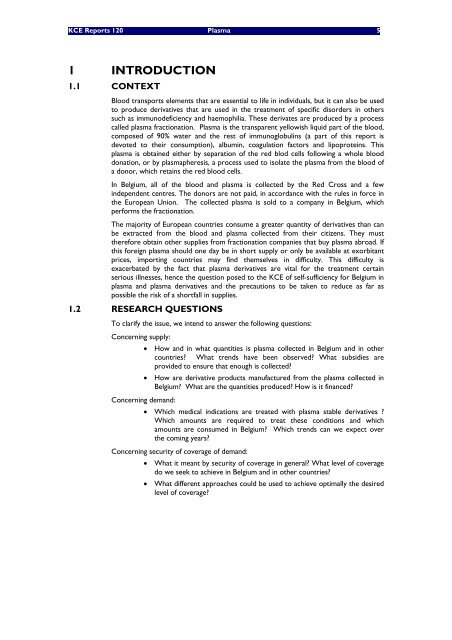The report is available in English with a French summary - KCE
The report is available in English with a French summary - KCE
The report is available in English with a French summary - KCE
Create successful ePaper yourself
Turn your PDF publications into a flip-book with our unique Google optimized e-Paper software.
<strong>KCE</strong> Reports 120 Plasma 5<br />
1 INTRODUCTION<br />
1.1 CONTEXT<br />
Blood transports elements that are essential to life <strong>in</strong> <strong>in</strong>dividuals, but it can also be used<br />
to produce derivatives that are used <strong>in</strong> the treatment of specific d<strong>is</strong>orders <strong>in</strong> others<br />
such as immunodeficiency and haemophilia. <strong>The</strong>se derivates are produced by a process<br />
called plasma fractionation. Plasma <strong>is</strong> the transparent yellow<strong>is</strong>h liquid part of the blood,<br />
composed of 90% water and the rest of immunoglobul<strong>in</strong>s (a part of th<strong>is</strong> <strong>report</strong> <strong>is</strong><br />
devoted to their consumption), album<strong>in</strong>, coagulation factors and lipoprote<strong>in</strong>s. Th<strong>is</strong><br />
plasma <strong>is</strong> obta<strong>in</strong>ed either by separation of the red blod cells follow<strong>in</strong>g a whole blood<br />
donation, or by plasmapheres<strong>is</strong>, a process used to <strong>is</strong>olate the plasma from the blood of<br />
a donor, which reta<strong>in</strong>s the red blood cells.<br />
In Belgium, all of the blood and plasma <strong>is</strong> collected by the Red Cross and a few<br />
<strong>in</strong>dependent centres. <strong>The</strong> donors are not paid, <strong>in</strong> accordance <strong>with</strong> the rules <strong>in</strong> force <strong>in</strong><br />
the European Union. <strong>The</strong> collected plasma <strong>is</strong> sold to a company <strong>in</strong> Belgium, which<br />
performs the fractionation.<br />
<strong>The</strong> majority of European countries consume a greater quantity of derivatives than can<br />
be extracted from the blood and plasma collected from their citizens. <strong>The</strong>y must<br />
therefore obta<strong>in</strong> other supplies from fractionation companies that buy plasma abroad. If<br />
th<strong>is</strong> foreign plasma should one day be <strong>in</strong> short supply or only be <strong>available</strong> at exorbitant<br />
prices, import<strong>in</strong>g countries may f<strong>in</strong>d themselves <strong>in</strong> difficulty. Th<strong>is</strong> difficulty <strong>is</strong><br />
exacerbated by the fact that plasma derivatives are vital for the treatment certa<strong>in</strong><br />
serious illnesses, hence the question posed to the <strong>KCE</strong> of self-sufficiency for Belgium <strong>in</strong><br />
plasma and plasma derivatives and the precautions to be taken to reduce as far as<br />
possible the r<strong>is</strong>k of a shortfall <strong>in</strong> supplies.<br />
1.2 RESEARCH QUESTIONS<br />
To clarify the <strong>is</strong>sue, we <strong>in</strong>tend to answer the follow<strong>in</strong>g questions:<br />
Concern<strong>in</strong>g supply:<br />
• How and <strong>in</strong> what quantities <strong>is</strong> plasma collected <strong>in</strong> Belgium and <strong>in</strong> other<br />
countries? What trends have been observed? What subsidies are<br />
provided to ensure that enough <strong>is</strong> collected?<br />
• How are derivative products manufactured from the plasma collected <strong>in</strong><br />
Belgium? What are the quantities produced? How <strong>is</strong> it f<strong>in</strong>anced?<br />
Concern<strong>in</strong>g demand:<br />
• Which medical <strong>in</strong>dications are treated <strong>with</strong> plasma stable derivatives ?<br />
Which amounts are required to treat these conditions and which<br />
amounts are consumed <strong>in</strong> Belgium? Which trends can we expect over<br />
the com<strong>in</strong>g years?<br />
Concern<strong>in</strong>g security of coverage of demand:<br />
• What it meant by security of coverage <strong>in</strong> general? What level of coverage<br />
do we seek to achieve <strong>in</strong> Belgium and <strong>in</strong> other countries?<br />
• What different approaches could be used to achieve optimally the desired<br />
level of coverage?

















